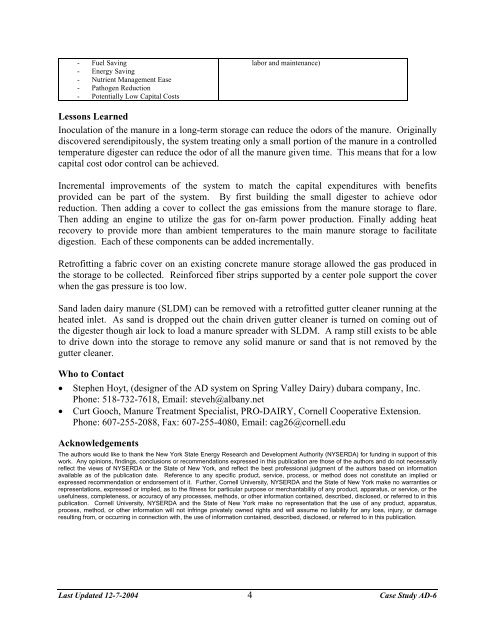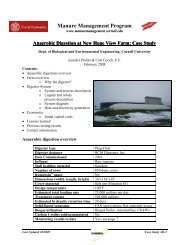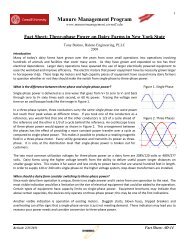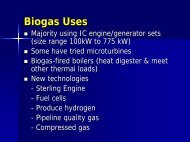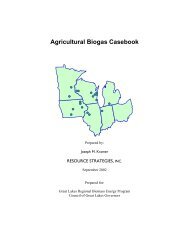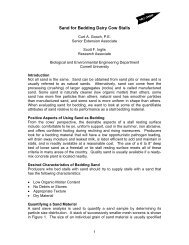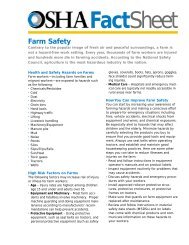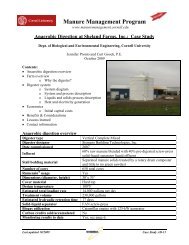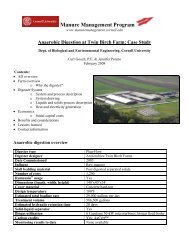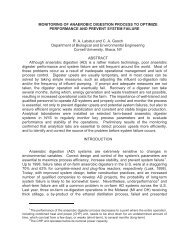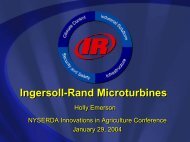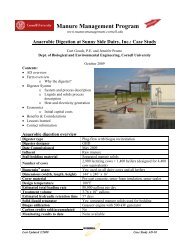Case Study AD-6 - Manure Management - Cornell University
Case Study AD-6 - Manure Management - Cornell University
Case Study AD-6 - Manure Management - Cornell University
Create successful ePaper yourself
Turn your PDF publications into a flip-book with our unique Google optimized e-Paper software.
- Fuel Saving- Energy Saving- Nutrient <strong>Management</strong> Ease- Pathogen Reduction- Potentially Low Capital Costslabor and maintenance)Lessons LearnedInoculation of the manure in a long-term storage can reduce the odors of the manure. Originallydiscovered serendipitously, the system treating only a small portion of the manure in a controlledtemperature digester can reduce the odor of all the manure given time. This means that for a lowcapital cost odor control can be achieved.Incremental improvements of the system to match the capital expenditures with benefitsprovided can be part of the system. By first building the small digester to achieve odorreduction. Then adding a cover to collect the gas emissions from the manure storage to flare.Then adding an engine to utilize the gas for on-farm power production. Finally adding heatrecovery to provide more than ambient temperatures to the main manure storage to facilitatedigestion. Each of these components can be added incrementally.Retrofitting a fabric cover on an existing concrete manure storage allowed the gas produced inthe storage to be collected. Reinforced fiber strips supported by a center pole support the coverwhen the gas pressure is too low.Sand laden dairy manure (SLDM) can be removed with a retrofitted gutter cleaner running at theheated inlet. As sand is dropped out the chain driven gutter cleaner is turned on coming out ofthe digester though air lock to load a manure spreader with SLDM. A ramp still exists to be ableto drive down into the storage to remove any solid manure or sand that is not removed by thegutter cleaner.Who to Contact• Stephen Hoyt, (designer of the <strong>AD</strong> system on Spring Valley Dairy) dubara company, Inc.Phone: 518-732-7618, Email: steveh@albany.net• Curt Gooch, <strong>Manure</strong> Treatment Specialist, PRO-DAIRY, <strong>Cornell</strong> Cooperative Extension.Phone: 607-255-2088, Fax: 607-255-4080, Email: cag26@cornell.eduAcknowledgementsThe authors would like to thank the New York State Energy Research and Development Authority (NYSERDA) for funding in support of thiswork. Any opinions, findings, conclusions or recommendations expressed in this publication are those of the authors and do not necessarilyreflect the views of NYSERDA or the State of New York, and reflect the best professional judgment of the authors based on informationavailable as of the publication date. Reference to any specific product, service, process, or method does not constitute an implied orexpressed recommendation or endorsement of it. Further, <strong>Cornell</strong> <strong>University</strong>, NYSERDA and the State of New York make no warranties orrepresentations, expressed or implied, as to the fitness for particular purpose or merchantability of any product, apparatus, or service, or theusefulness, completeness, or accuracy of any processes, methods, or other information contained, described, disclosed, or referred to in thispublication. <strong>Cornell</strong> <strong>University</strong>, NYSERDA and the State of New York make no representation that the use of any product, apparatus,process, method, or other information will not infringe privately owned rights and will assume no liability for any loss, injury, or damageresulting from, or occurring in connection with, the use of information contained, described, disclosed, or referred to in this publication.Last Updated 12-7-20044<strong>Case</strong> <strong>Study</strong> <strong>AD</strong>-6


